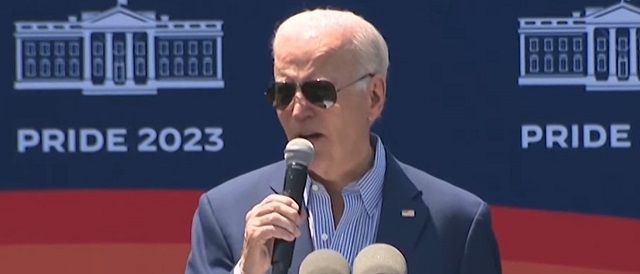International
Years Of Media Misdirection Over Biden Mental State Are Unraveling Before Our Eyes

 From the Daily Caller News Foundation
From the Daily Caller News Foundation
By JASON COHEN
Corporate media’s years-long effort to sweep questions about President Joe Biden’s mental fitness under the rug took a devastating blow after his debate with former President Donald Trump.
Voters have long been concerned about Biden’s mental fitness being insufficient to be president, and Republicans have repeatedly raised doubts about his cognitive competence, including during the 2020 campaign as he made numerous gaffes. Despite concerns from Americans, legacy media outlets have consistently downplayed their legitimacy and criticized those who voiced them, even suggesting the narrative of incompetence stems from Russia.
WATCH:
Joe Scarborough, March:
“I’m gonna tell you the truth, and f* you if you can’t handle the truth: This version of Biden is the best Biden ever” pic.twitter.com/RWij2c4Zfg— Philip Reichert (@PhilipReichert) June 28, 2024
CNN published an analysis in August 2021, concluding that concerns about Biden’s cognitive capabilities were mostly a “moot” issue. The analysis suggested it was primarily Republicans who were pushing the narrative that Biden is diminished.
“This is the sort of gross, lowest-common-denominator politics that drive people away from public life,” the analysis by former CNN editor-at-large Chris Cillizza stated. “If Republicans have some sort of proof that Biden is declining, they should bring it forward. If they don’t, they should stop doing what they’re doing. Immediately.”
The NYT published an opinion piece in November 2020 titled “Stop Worrying About Biden’s Age. We Need His Wisdom Right Now” that stated, “I can’t be bothered with the despicable Sleepy-Joe canard that the right is peddling, except to say that if this is what dementia looks like, I don’t know what to call my own flashes of forgetfulness, in which words, keys and hair scrunchies regularly desert me.”
Moreover, The Hill published a piece in November 2019 suggesting Biden’s frequent gaffes are due to a stutter he has had since he was a child rather than cognitive decline.
“Some have been quick to question Biden’s mental fitness, hinting at a possible age-related cognitive decline (he just turned 77 years old), but it’s important to consider that many of those missteps could have been caused by his lifelong struggle with a speech impediment,” The Hill stated.
Special counsel Robert Hur published a report in February finding Biden mismanaged classified documents, but he opted not to seek charges against the president because of the improbability of obtaining a conviction based on the likelihood a jury may perceive the president as “a sympathetic, well-meaning, elderly man with a poor memory.” Corporate media defended Biden’s lucidity and attacked Hur as partisan and deceptive after a transcript of their interview was published, revealing memory lapses, such as appearing to forget when he began and ended his vice presidency and the date of his late son Beau’s death.
For instance, the NYT reported that “Biden appeared clearheaded most of the time” and that he “went into great detail about many matters,” while The Washington Post noted that “Biden doesn’t come across as absent-minded as Hur has made him out to be.”
NBC News acknowledged Biden’s “memory lapses” during the interview, but highlighted the “detailed exchanges” that took place in its headline.
Several clips about Biden in June amassed attention for underscoring the 81-year-old’s diminished fitness and increased gaffes, including the president freezing and wandering off. The White House, in the month leading up to the debate, characterized concerning videos of Biden as “cheap fakes,” and the media picked up on the narrative.
“‘Cheapfake’ Biden videos enrapture right-wing media, but deeply mislead,” a headline by The Washington Post on June 14 read.
“The use of these clips is an especially pernicious couple of examples of manipulated video… because it’s intended to create a false narrative that doesn’t reflect the event as it occurred,” the outlet asserted, stating that the style of editing made them misleading. The NYT published an article titled “How Misleading Videos Are Trailing Biden as He Battles Age Doubts” on June 21, similarly claiming the cropping of the videos makes them deceptive.
The latest panic about Biden’s age and fitness has led to the president facing growing high-profile calls to drop out of the race, such as from a prominent columnist and a Democratic representative. Five significant media publications, including the NYT, called for Biden to withdraw, and two urged him to at least consider it, The Hill reported on Sunday.
“There’s ample speculation online about what the news media did and didn’t do with respect to covering the president’s age,” NYT executive editor Joe Kahn said in a note to NYT journalists on Wednesday that the outlet shared with the Daily Caller News Foundation. “What I’ve seen and what our readers have experienced from our team is steadfast, fact-based reporting on the subject that began a couple of years ago as we documented Biden’s age-related challenges in multiple, industry-leading articles. We have stayed on that story at every turn, always with nuance and context, through today’s outstanding report.”
The coverage of Biden’s competence should have been more intense, some reporters who cover the White House told CNN anonymously on Tuesday. One reporter told the outlet they erred by not probing more after Hur’s report.
“The right-wing media was calling him senile from day one, and that wasn’t true,” the reporter told CNN. “Then whenever you report on the age you were in some ways solidifying, giving credence to some people that were actually of bad faith.”
MSNBC’s “Morning Joe” host Joe Scarborough said in March that the current “version of Biden — intellectually, analytically — is the best Biden ever. Not a close second and I’ve known him for years… If it weren’t the truth, I wouldn’t say it.”
Scarborough asked on Friday, after the debate, if Biden should withdraw from the race, raising concerns about his capability to run the country and beat Trump.
The Washington Post, NBC and The Hill did not respond to the DCNF’s request for comment.
International
Trump and Xi meet in South Korea, signal thaw after year of tariff wars

President Trump and Chinese President Xi Jinping met Thursday in South Korea for their first summit since Trump’s return to the White House, striking a tone of cautious optimism as they sought to cool trade tensions that have strained relations between the world’s two largest economies. Meeting at a South Korean air base, the two leaders exchanged warm greetings and spoke positively about finding common ground after a year of tariff battles. “Great pleasure to see you again,” Xi told Trump as cameras flashed. Trump responded that he expected a “very successful meeting” and predicted a “great understanding” between the two sides.
.@POTUS meets with Chinese President Xi Jinping for the first time since 2019: "It's a great honor… I think we're going to have a fantastic relationship for a long period of time — and it's an honor to have you with us." pic.twitter.com/ueW2gvMcCy
— Rapid Response 47 (@RapidResponse47) October 30, 2025
Xi, speaking through an interpreter, praised Trump’s leadership and said China’s progress “goes hand in hand with your vision to make America great again.” He emphasized that both nations could “help each other succeed and prosper together,” framing the talks as a step toward renewed partnership rather than rivalry. The meeting followed weeks of negotiations between U.S. and Chinese trade officials, who had reached a “basic consensus” on key issues in advance. Xi noted that the talks yielded “encouraging progress” on “major concerns” for both nations and even commended Trump’s role in mediating other global disputes, including conflicts in the Middle East and Southeast Asia.
According to U.S. officials, Trump’s team has signaled readiness to scale back select trade duties if Beijing meets enforcement commitments. The president is expected to ease some of those measures in exchange for China’s one-year suspension of export restrictions on rare-earth and critical minerals — materials vital to American manufacturing. In return, Beijing will reportedly intensify efforts to curb fentanyl smuggling, which U.S. data shows has contributed to roughly one in every 1,000 American deaths over the past five years. China is also preparing to resume large-scale soybean purchases, reversing retaliatory tariffs that hit U.S. farmers earlier this year.
While Trump acknowledged Xi as a “tough negotiator,” he told reporters he had “no doubt” the summit would deliver results. The meeting — framed around mutual economic relief and renewed cooperation — marked a rare bright spot in a relationship defined by tariffs, tech restrictions, and strategic competition. Whether the goodwill in Seoul translates into lasting policy changes remains to be seen, but Thursday’s encounter suggested both leaders are eager to ease tensions and show progress after a bruising trade standoff.
Health
Leslyn Lewis urges Canadians to fight WHO pandemic treaty before it’s legally binding

From LifeSiteNews
Conservative MP Leslyn Lewis is urging Canadians to demand a parliamentary debate on the WHO Pandemic Agreement, highlighting risks to national sovereignty.
Conservative Member of Parliament (MP) Leslyn Lewis called on Canadians to petition against the World Health Organization’s (WHO) pandemic treaty before it becomes legally binding.
In an October 23 post on X, Lewis encouraged Canadians to demand that politicians debate the WHO Pandemic Agreement before it becomes law after warnings that the treaty could undermine national freedom and lead to global surveillance.
“I have raised red flags about its implications on Canada’s health sovereignty and the federal government’s willingness to enter a legally binding treaty of this weight without any input from Parliament,” she declared.
In May, Canada, under Liberal Prime Minister Mark Carney, adopted the treaty despite warnings that the agreement gives the globalist entity increased power in the event of another “pandemic.”
However, Lewis revealed that since the agreement has yet to be officially signed, Canada is not bound to it and can still make amendments.
“We are now in a critical window of opportunity to ask tough questions and debate the treaty before it is signed by the Minister of Foreign Affairs and binds our nation,” she explained.
Lewis encouraged Canadians to sign a petition calling for a debate of the agreement as well as contacting their local MPs to request a parliamentary review of the treaty.
Lewis revealed that Canadians’ persistent opposition to the treaty has already resulted in some of the more dangerous clauses, including restricting free speech, freedom of movement, and government surveillance, being removed from the final agreement.
“Thanks to the engagement of countless Canadians and concerned citizens around the world, the most extreme provisions in the WHO Pandemic Treaty were removed — these measures would have undermined national healthcare sovereignty and given international bureaucrats sweeping powers,” Lewis declared.
“The removal of provisions on vaccine mandates, misinformation and disinformation, censorship requirements, travel restrictions, global surveillance, and mandatory health measures happened because people paid attention and spoke up,” she continued.
Among the most criticized parts of the agreement is the affirmation that “the World Health Organization is the directing and coordinating authority on international health work, including on pandemic prevention, preparedness and response.”
While the agreement claims to uphold “the principle of the sovereignty of States in addressing public health matters,” it also calls for a globally unified response in the event of a pandemic, stating plainly that “(t)he Parties shall promote a One Health approach for pandemic prevention, preparedness and response.”
-

 Business2 days ago
Business2 days agoTrans Mountain executive says it’s time to fix the system, expand access, and think like a nation builder
-

 Business2 days ago
Business2 days agoFlying saucers, crystal paperweights and branded apples: inside the feds’ promotional merch splurge
-

 International1 day ago
International1 day agoStrongest hurricane in 174 years makes landfall in Jamaica
-

 Internet1 day ago
Internet1 day agoMusk launches Grokipedia to break Wikipedia’s information monopoly
-

 MAiD1 day ago
MAiD1 day agoStudy promotes liver transplants from Canadian euthanasia victims
-

 Business1 day ago
Business1 day agoCanada has given $109 million to Communist China for ‘sustainable development’ since 2015
-

 Business2 days ago
Business2 days agoCanada’s combative trade tactics are backfiring
-

 International2 days ago
International2 days agoBiden’s Autopen Orders declared “null and void”









